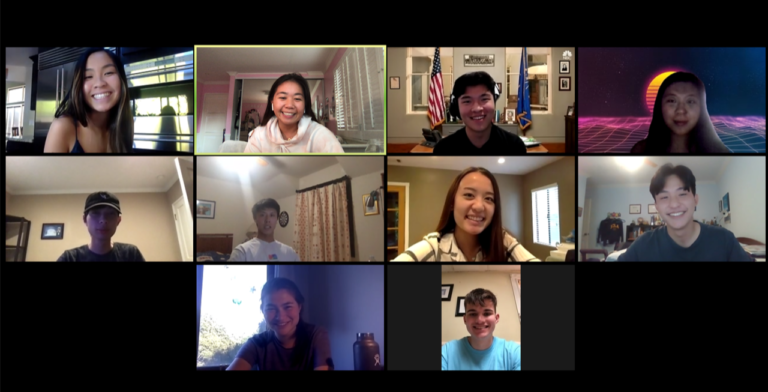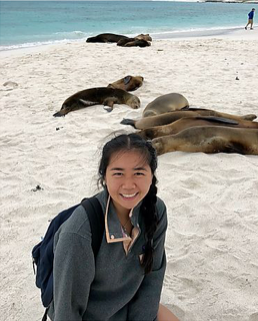
Earlier this year, students from Johns Hopkins University (JHU) organized a five-day COVID-19 Virtual Design Challenge. This hackathon brought together bright minds from around the world, inspired them with direct input from healthcare experts on the front lines, and equipped them with effective design processes to make a difference in the rapidly evolving pandemic. Numerous students took part to apply their STEM skills in addressing relevant public health issues, while forming teams with broad expertise – including biology, public health, computer science, engineering, applied math, and statistics – to create innovative solutions. ESAL spoke to Serena Wang from CovidSMS – one of the finalists of the challenge, and a rising senior studying public health at JHU – to understand more about the inception and development of their idea.
RD: Why did the team decide to take part in this hackathon?
Wang: Inspired by healthcare workers who had been reusing the same N95 mask throughout the pandemic, and wanting to do my part to help, I participated in the hackathon and co-founded CovidSMS, a texting service that provides local coronavirus information. With a diverse team of public health and computer science students, we found it important to utilize innovative technologies in the public health intervention we created. As they are rarely used by low income communities, we found it important to alleviate the disparity in technology literacy and access in vulnerable populations with a creative solution.
RD: What was your solution?
Wang: CovidSMS is a service that uses text messages to provide users with accurate local coronavirus information and relief. Individuals can text their ZIP code to (888)-414-5539. They will then be given options to: subscribe to daily updates, switch ZIP codes, receive COVID-19 statistics for the two closest counties, and provide ZIP code-specific resources (e.g. to find testing sites, unemployment resources, food resources, or request assistance). It also allows city officials and community leaders to notify residents about geographically-relevant resources

JHU student Serena Wang.
RD: How did you decide on this idea?
Wang: With the spread of misinformation and the overwhelming amount of information in the media, it is important to synthesize accurate information so people can make well-educated decisions, particularly in communities that have been disproportionately affected by the pandemic. The disparity in technology literacy and access has been exacerbated by COVID-19, leaving individuals misinformed, unable to practice safe behaviors, and without resources. Moreover, while only 51% of low income Americans have access to the Internet, 71% of them have access to a basic phone with texting capabilities. For those who face these barriers in technology, receiving “basic information” is not easy. CovidSMS endeavors to solve this problem.
It has become essential for scientists and public health officials to make research and findings easily digestible. The pandemic has highlighted the need for effective scientific communication as there are life and death consequences. With increasing spikes in cases, it becomes necessary and crucial for scientists to disseminate information in a way that ignites behavioral change and collective efforts to tackle the virus.
RD: How do you ensure you are obtaining accurate information to disseminate?
Wang: We receive our statistics directly from the Johns Hopkins Center for Systems Science and Engineering, public health departments of corresponding cities, Feeding America, and GoodRx. We also focus on sending announcements and receiving information directly from community leaders and government officials. Soon, we will be translating our services to Spanish and providing additional coronavirus information for our users.
We picked statistics as our first piece of information to disseminate due to a survey which asked what information people would want to receive via text message. Our hope with the daily subscription to statistics is that individuals would see the increasing cases/death rates in their cities and recognize the impact of the virus in relation to themselves. Furthermore, after speaking to over 40 community organizations, city officials, and leaders, we found that vulnerable populations were especially in need of resources to alleviate challenges exacerbated by the pandemic. Therefore, we provide testing sites, unemployment, food and requesting support as resources.
RD: What have you been working on since the hackathon?
Wang: In addition to the ZIP code-specific resource directory, we have fostered partnerships, including:
1. San Marino, CA
In April, we partnered with the city of San Marino where our team created a login portal for city officials and community leaders to schedule and broadcast announcements via text message. Our service differed from existing push notification systems because we provide 2-way communication. Not only could leaders send notifications, citizens could text their leaders concerns or feedback and answer questions.
2. Covaid
With the exacerbated technology gap, our team wanted to develop partnerships with organizations that specifically target vulnerable populations but did not have the accessible platform to do so. Thus, we partnered with Covaid, an online platform that connects people to volunteers from mutual aid organizations to help with grocery deliveries, medication pick-up, and much more. Our SMS platform makes this resource more accessible and available to the communities that need it most.
3. UCLA Against Covid-19
From our community outreach team, CovidSMS found that Spanish-speaking populations were not receiving basic COVID-19 information about how to properly wear a mask, symptoms of the virus, and even how to properly social distance. Our team partnered with UCLA Against COVID-19 which focuses on providing multilingual coronavirus information, translating materials to Spanish, Korean, Chinese, and Vietnamese.
RD: How has your engagement been with local communities and governments?
Wang: Currently, governmental organizations are overextended and overburdened, and have been harder to reach. Meanwhile, community organizations have been much more open to providing feedback and developing partnerships with CovidSMS. Community work requires the development of relationships and trust to ensure that our work is serving their community to the best of our ability. Our community outreach team is currently creating a pilot study and questionnaire to thoroughly evaluate the impact of our service, while working with public health professors and community organizations to effectively disseminate our service and conduct an impact assessment.
RD: What advice do you have for engineers and scientists who want to get involved in their communities?
Wang: It is important for individuals to stay educated and aware about the disparities and inequities that persist in their own and surrounding communities. Prioritize working with communities and for communities, never on communities by listening and challenging your own assumptions and biases.
For more ways to get engaged in your community's COVID-19 response, please visit ESAL's COVID-19 Resources for Engineers & Scientists page.
Do you have a story to tell about your own local engagement or of someone you know? Please submit your idea here , and we will help you develop and share your story for our series.